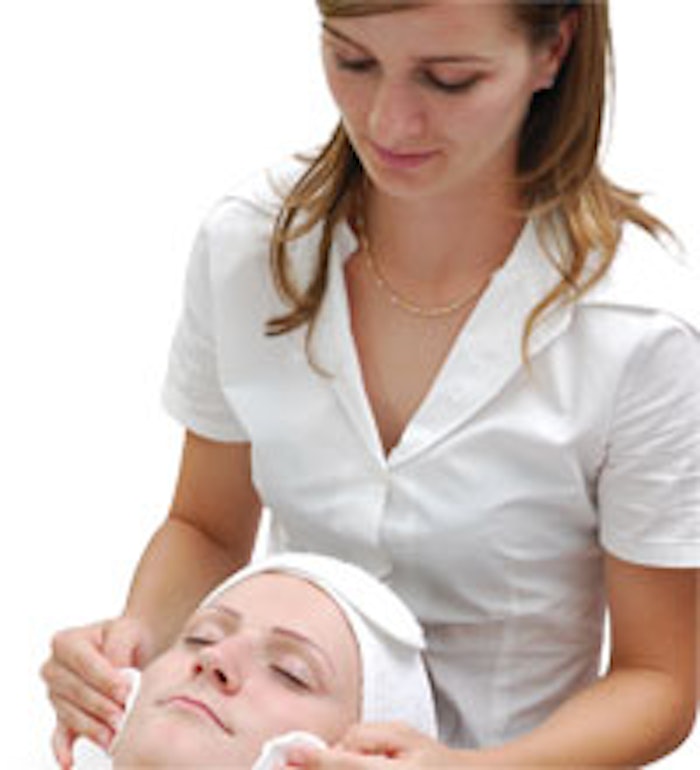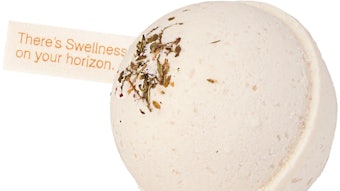
Studies show that people are happiest when they are in control. Makes sense; after all, control translates to getting what you believe you deserve, and not being at the mercy of another’s whims and behavior.
However, everyday details that are out of your control, such as last-minute cancellations, no-shows, returned checks or disrespectful client behavior, can disrupt the happiness that otherwise might be yours. This, combined with requirements to sell products, a task that, for some skin care professionals, makes for uncomfortable client interactions, can result in professionals who find themselves far from “in control,” and distant from happiness. Rest easy: Clarity lies in committing to the sustainability of your work.
That commitment requires giving excellent facials and caring for—and about—the client; designing innovative and individualized treatment plans, which includes selling products; and setting the ground rules of good client behavior, which means the hard work of actually enforcing boundaries.
Caring for the client
Caring for—and about—clients means establishing trust and fostering a feeling of safety for them while you attend to their skin needs. Along with breezy chats, you hear stories of loss, anxiety and alcohol abuse. You bear witness to a client’s sickness from chemo and radiation, while doing what can be done for her suffering skin. You hear the pain of the acne client, whose life, as much as her face, bears scars. You intuit the fear of the aging client, who dims the bathroom lights before looking into a mirror, avoiding the face she scarcely recognizes, only to glimpse, over her shoulder, at the anonymity of age waiting to silence her voice.
And to think there are those who dismiss the skin care profession as merely pampering, this coming together of intimacy and help called a facial.
Commitment to sustainability involves realizing, deciding and believing. Realizing that your work provides necessary, healing, even transformative services. Deciding that charging money for the value given is OK, that you are valuable for your skills, and that being well paid for those skills is not only appropriate, it’s justly earned. Believing that you deserve the reciprocity of respect for your work and for your time.
The selling dilemma
Ah, but here’s the rub—you are also one who sells products, which can feel as though you’ve crossed the line from compassionate nurturer to used car salesperson, and that you’re taking advantage of the tender trust that forms the foundation of your relationship with the client.
It can be ambiguous, this relationship, because you both nurture and sell. But the counters at Nordstrom or Sephora? Crystal clear. Everyone expects the salesperson will try to up-sell. Inevitably, what begins with eye liner ends with gold-smudged red-lip bronze cheek thingys, with eyes pinwheels of desire and hands clutching the “free” samples that made it a monetary triumph. With skin care professionals, though, the shopper becomes the client, who, not expecting a sales pitch, raises her defenses and triggers your discomfort.
Alternatively, skin care professionals often view sales with a condescending eye as in: “Selling is beneath me; I’m a professional.” Although this is understandable, here’s the reality: That stance actually undermines true commitment to service. As much as they need your listening ability, clients also need your expertise to design a customized routine. Just as with care, sales are an inevitable and integral part of esthetics, which realize the commitment you’ve made to the sustainability of your work, and to the well-being of the client’s skin.
The moment before zero
So how do you manifest this integral part of esthetics without feeling as though you’re a fraud who promised a restful experience, only to spring the sales trap? In an episode of the podcast The Tobolowsky Files, the character actor Stephen Tobolowsky discusses this idea in relation to acting in “The Moment Before Zero.”
“ ‘Zero’ is when we go back to the beginning. Of course, once something has a beginning, it also has a history, and what we know about history is that it often repeats itself. For example: An actor reaches the end of a scene and it hasn’t worked, so she starts over. But these beginnings can be riddled with holdover moments of, say, tears or anger from the just-finished last scene. The old emotions sabotage the intent to begin anew, and unhappily confirm the actor’s insecurities about worth and skill.”
Let’s turn to the skin care professional who tries this month for a sale with last month’s client—the one who said “no” to products. Being turned down is akin to personal rejection, because sales can feel as though you’re really asking if clients want to buy your talent and vision along with that cream. This gives birth to other feelings, such as embarrassment or failure, paralyzing your intentions to let go of the past, approach the client anew and sell now.
It’s no different for estheticians than for millions of others throughout the world: No matter the sales technique, it winnows down to taking a breath, opening your mouth and being willing to put yourself on the spot by asking, “Will you buy this?” It’s called “making the ask,” and requires courage.
This is where Tobolowsky locates the moment before zero: It’s before any history, before your experiences and feelings about sales. He explains, “When you change the starting point, you change the story, so that you can tell a different story.” After this moment, you can start fresh in three ways, according to Tobolowsky: imagination, matters of the heart or just magic.
Imagination. In that place of the imagination, you envision sales as part of service ... but then ambivalence ambushes you. Ambivalence is an issue of commitment, located in “opposing extremes of conviction,” as psychologist Sigmund Freud called it, when you are strongly drawn to one way of thinking and acting—that of nurturing the client—while being pulled in the diametrically opposed direction of sustainability and sales. Just how do you navigate this true ambivalence?
Interestingly, the poet Samuel Coleridge believed that the coming together of two opposites birthed a third and different force, which psychiatrist Carl Jung named when writing about polar opposites: “The eventual integration of the two creates Wholeness.” Imagining the connection between service and sales creates that place of wholeness, which sings with integrity and imagination.
Matters of the heart. What would you do if you weren’t afraid? Well, you would probably speak your truth. You’d set ground rules for clients, and consider sales in this distinct way—sales are an offering of help. Whether or not clients want it in that moment doesn’t change the fact that it is help.
Just magic. It’s the magic that happens when you wholeheartedly dare to be yourself, someone who leans into uncomfortable feelings to make the ask. Skin care professionals who find this courage fully experience the electrifying truth that what you do and offer—or what you don’t do and don’t offer—deeply affects clients and their well-being. And yes, sometimes that means making mistakes, but that’s why pencils have erasers on the other end; you are meant to choose action instead of ambivalence.
Enforcing client boundaries
Client behaviors are another obstacle to realizing the control you crave. If you’re bending over backward to accommodate bad behavior because you’re afraid clients will leave, then it always turns out badly, because what you’re unconsciously doing is working to be liked, and that becomes the commitment, not true service or a sustainable life.
In essence, your commitment to the client deserves the reciprocity of respect. Canceling without 24-to-48 hours notice isn’t respectful. No-shows? Downgrading the facial to a brow wax upon arrival? Asking what products you’d recommend in the drugstore? Bouncing checks? Not respectful. Personally understanding that you, your work and your time deserve respect is a game-changer. It emboldens you to speak for yourself and to train the client in being a client. This is not easy, and it requires courage. But better this than the story a friend once told me about the client who, following her upstairs to the treatment room, said: “My, you have a fat behind.” Speechless and hurt, my friend didn’t respond or know how to let her go as a client; how would you have handled it?
A guide could be the following language: “I have a cancellation policy of 24-to-48 hours; unless you’re sick or there’s an emergency (work emergencies don’t count, because then your work emergency becomes my work emergency) then the full price of the booked service is due. Because the policy is clear, it’s helpful, when you cancel, if you volunteer to send the check. It feels awkward if I have to remind you, which can affect the work we do together.”
Can exceptions be made to rules? Sure; but to make them, there must first be rules.
Change your story
Heeding what Tobolowsky has explained, you can change the starting point of your story. This different story rids you of the lying tales that had captured your thoughts, of not being good enough or young enough or old enough, or that sales are beneath you, or that the client will leave. Instead, recognizing that what exists within you is purpose, striving to do and be better, commitment to sustainability and to help. This new and different story encompasses the Buddhist concept of upaya-kausala, or skillful means: You will do whatever you must, professionally and intuitively, to care for clients in a complete and healthy way, in order to lead them to skin care enlightenment, and lead yourself to a commitment to the sustainability of your work. It is in this that you recognize and experience joy as the true child of courage and control.
Anne Martin is a licensed esthetician and esthetic instructor, and is also a CIDESCO diplomate. She is a magna cum laude graduate of the University of Massachusetts, Boston, and studied at the Harvard Divinity School. Martin graduated from the Elizabeth Grady School of Esthetics. She is the founder and chairperson of the NW Aestheticians’ Guild and chairperson of the Washington State Advisory Board for Cosmetology, Manicuring, Barbering and Esthetics. Along with Mark Lees, PhD, she co-founded the Institute of Advanced Clinical Esthetics, offering advanced seminars for estheticians. Martin currently has a private practice in Seattle where she specializes in the treatment of acne. She can be contacted at [email protected].










